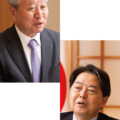Abe Shinzo on Japan’s diplomacy during the seven years and eight months he was in office (Part IV): The structures, people and language that supported prime ministerial diplomacy.
How the National Security Council functioned as a command tower for diplomacy and defense, crossing silos between ministries and government offices. Revising speeches again and again to deliver Japan’s messages to the hearts of people in partner countries. Abe Shinzo talks about the essentials of diplomacy in a democratic nation, i.e., flexible structures and the public opinion to support them.
Tanaka Akihiko, President of the National Graduate Institute for Policy Studies (GRIPS)
Recovering national consciousness via politics
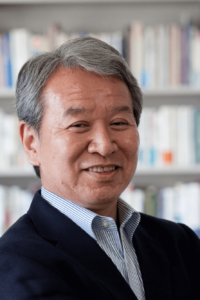
Tanaka Akihiko, President of GRIPS
Tanaka Akihiko: This will be the last in our series of interviews. To begin with, from your first administration you spoke about a “departure from post-war regimes”; so, looking back now, how far do you think you managed to achieve that objective?
Abe Shinzo: The most significant point in question for post-war regimes is the constitution. From the start of my first administration, I wanted us to craft a new constitution. Unfortunately however, we still haven’t reached the point of constitutional revision. Nevertheless, compared to the time of my first administration, discussion on revision of the national referendum law has proceeded in the Constitution Research Council of both Diet houses and an amendment bill has been passed in the House of Representatives, so I believe momentum is gathering for constitutional debate in the Diet.
Regarding my personal concerns, I have a sense of unease and crisis about the extremely weak awareness of the role of the state in post-war Japan. Domestically, there is a tendency to dwell only on the individual rights of citizens, and internationally on solidarity with the UN and cosmopolitan citizenship, Many people have evaded thinking seriously about the role of the state. One worrisome consequence of that is reflected in education and we passed a Revised Fundamental Law of Education during my first administration.
Another consequence is in security, particularly a dearth of realistic thinking about military matters. During my first administration we upgraded the Defense Agency to the Ministry of Defense. During my second administration we established the National Security Council (NSC) and drew up a National Security Strategy (NSS). We also passed the Legislation for Peace and Security and, with conditions, opened up a path for exercising the right of collective self-defense. Regarding the NSC in particular, the creation of an organization that would be a command tower for the whole government, uniting diplomacy, defense and intelligence under the Prime Minister, was extremely meaningful from the perspective of our national interests.
Tanaka: Until the 1990s, when you used the term “national interest” in the mass media and academia, you were often called “a right winger.” But nowadays many people talk about national interests, and we’ve become able to have more realistic discussions about defense. There’s been a big change these 10 some years.
Abe: It’s the same in the world of politics. When my father was Minister for Foreign Affairs, he avoided the word “national interest.” But these days the opposition parties talk openly about national interests in the Diet. We have become able to address not just security but even the field of development assistance from the perspective of national interests.
The “Yachi System” that made the NSC function
Tanaka: I’d like to ask once more about the role that the NSC played in Abe Diplomacy. The NSC’s predecessor body, the Security Council of Japan, appeared mostly a formality.
Abe: In short, the Security Council of Japan was a council to approve the defense budget, not a place to discuss systematic policy. In that sense, as you say, it had a strongly ceremonial element. To be honest, when I first participated in the council as Deputy Chief Cabinet Secretary, I thought, “so this is it?”
Tanaka: How did things change after launching the NSC?
Abe: In the central four-minister meeting (Prime Minister, Chief Cabinet Secretary, Foreign Minister and Defense Minister) we have frank discussion about major strategy and important policies related to diplomacy and security, and also about analysis of intelligence on which those are based. I can’t speak in detail but there were very lively discussions about things such as missile defense and deterrence, and how to face China. Because we four ministers fully shared the details of the discussion the subsequent policy making process became smooth and a sense of cabinet unity was created.
Tanaka: I once heard from a former member of the Ministry of Foreign Affairs that Japan’s diplomatic policy was tantamount to an agreement between three individuals: Director, Director-General and Vice-Minister within the Ministry of Foreign Affairs. That changed a lot during your time in office.
Abe: We became able to analyze from various angles, not just in terms of bilateral relations. That meant to think about issues while bearing in mind the whole Indo-Pacific power balance, particularly the situation with China. It meant implementing concrete policies while viewing Japan-China relations not just bilaterally, but as positioned within a large strategy. Without the NSC, I don’t think prime ministerial diplomacy would have been practical.
Tanaka: Capable staff from various ministries gathered in the National Security Secretariat (NSS), the office of the NSC.
Abe: Each ministry sent us excellent staff. A notable figure among these was Yachi Shotaro, who served as the Secretariat’s first head. Before then, the Ministry of Foreign Affairs, Ministry of Defense, and National Police Agency tended not to cooperate well. They kept information within their agencies and tended not to share it. In that situation, if Yachi had behaved like a representative of the Ministry of Foreign Affairs the NSS wouldn’t have functioned. But, from when he was in the Ministry of Foreign Affairs, he had relationships with a wide range of people, in the Ministry of Defense, National Police Agency, and business world and academia too—so he had both a strong network and personal integrity. The current head, Kitamura Shigeru, is also more than just a representative of the police. You can create structures all you want, but they don’t work without people.
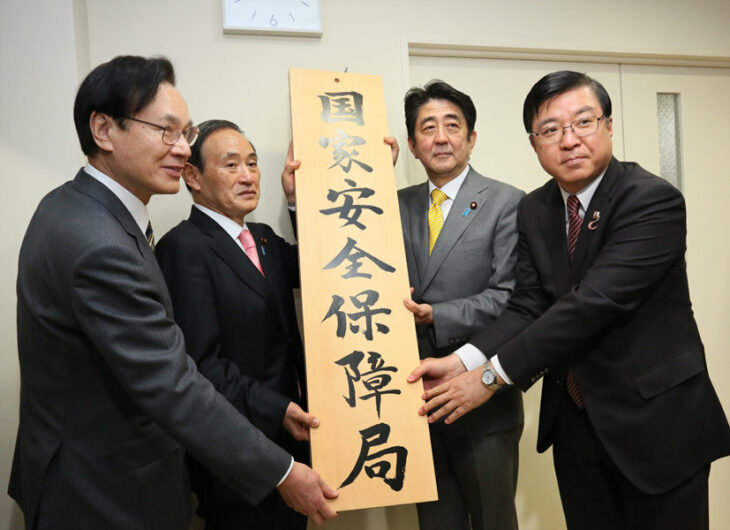
Yachi Shotaro (left) holds up a signboard for the National Security Secretariat with Prime Minister Abe (second right) on January 7, 2014.
Photo: Cabinet Public Relations Office
Tanaka: The US National Security Council makes many classified strategy documents, but Japan has classified strategy documents of that kind, doesn’t it? When it comes to a nation’s key policy making it’s natural for there to be undisclosed documents. On the other hand, in the sense of verifying history, it is better that not everything is secret forever and that, at a point when a certain amount of time has passed, a proportion of those strategy documents are considered for release. What is your view?
Abe: As you point out, to an extent I think documents that can be disclosed should be shared with the people.
An encounter with speechwriter Taniguchi Tomohiko
Tanaka: Compared to previous Japanese Prime Ministers, you have worked particularly hard at speeches. You have given a succession of highly polished speeches with many colorful anecdotes, not only general policy speeches and administrative policy speeches in the Diet, but also speeches to international meetings and the legislative bodies of other nations.
Abe: A distinctive feature of my administrations was that I employed a speechwriter. Without a speechwriter, speeches are a patchwork of texts from different ministries, and ultimately they tend to become “documents” that only list facts and achievements. As a politician I want to give speeches that reach the hearts of audiences and sway their thoughts. That is even more true when it comes to the international stage, where I need to raise Japan’s profile.
When it came to major overseas speeches, those were written by Taniguchi Tomohiko. At the speech preparation stage, Mr. Taniguchi would speak with me many times, sometimes getting into my life and picking up various anecdotes. Then he would write a text that conveyed my views more than 100 %. I think that for him—without exaggeration—it was a body and soul effort. For speeches within Japan, as well as Taniguchi I was helped mainly by Saeki Kozo, by Deputy Counselor Hino who is a young female official at the Cabinet Secretariat, and others.
Tanaka: Where did you first encounter Mr. Taniguchi?
Abe: That goes back to my first administration. At the time, Taniguchi was writing speeches for Foreign Minister Aso Taro as his Deputy Press Secretary. The first work I requested of him was a speech to the Indian parliament in August 2007 called “Confluence of the Two Seas.” It was a very impressive speech and when I launched my second administration, I asked him to join as a writer.
In fact, his first speech for my second administration was the Prime Minister’s Address at the Memorial Ceremony for the War Dead on 15 August 2013. Rather than the actual contents of that address, all attention was on how the language used in the address differed from past addresses. But bearing in mind the meaning of a memorial ceremony for the war dead, I thought that we should direct comments to the spirits of the war dead, and that it wasn’t necessary to express things such as regret inappropriate to the occasion. I conveyed that to Taniguchi and we started to work out a plan. But doing so, it also became necessary to make large-scale changes to the whole structure of the speech. So, I went ahead and read out an unprecedented speech that included some poetic expressions. Although the following year I returned to the previous style, that first speech was extremely good, so I asked Taniguchi to keep writing speeches for me.
Swaying world opinion through the power of speeches
Tanaka: There were a number of other impressive speeches, weren’t there?
Abe: One I remember particularly well is a July 2014 speech to an assembly of the Australian Senate and House of Representatives. I have already discussed the gist of the speech (Gaiko Vol. 64, Discuss Japan No. 63), but when I looked back at the history of our countries, I brought up the fierce WW2 battlegrounds of Kokoda and Sandakan, expressing, rather than apology, my grief for those who lost their lives there, and my gratitude for the generosity of spirit that post-war Australia has shown to Japan.
Also, as a kind of performance, it included a style of speech where I addressed guests sitting in the gallery. It’s something you often see in Europe and the United States, but unusual in Japan. That was also Taniguchi’s idea. I expressed thanks to Robert McNeil who came to Japan after the Great East Japan Earthquake as the leader of a rescue team, and also, in connection with the Olympics, to Fraser Dawn who was a women’s swimming athlete at the 1964 Tokyo Olympics, and I told her, “Please also come to Japan in 2020.” I linked her name, Dawn, to calling for a new dawn in Japan–Australia relations.
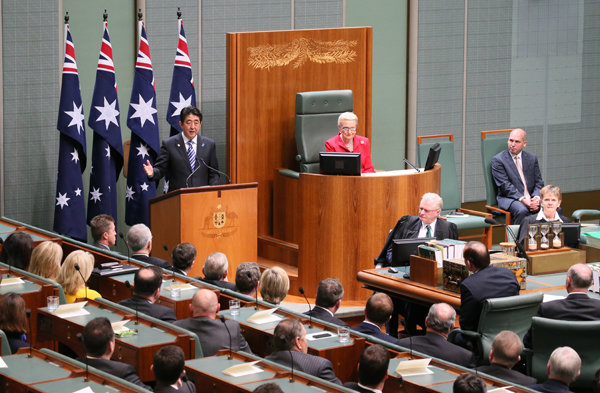
Prime Minister Abe delivers a speech to the Australian Parliament on July 9, 2014.
Full video: https://nettv.gov-online.go.jp/eng/prg/prg3845.html?nt=1
Photo and video: Cabinet Public Relations Office
Similarly, during my April 2015 address to a joint meeting of the US Congress, I invited Lt. Gen. Lawrence Snowden. I introduced him as a soldier who landed on Iwo Jima in January 1945 and after that often participated in memorial services held on Iwo Jima jointly by Japan and the United States. I quoted his words, “We didn’t and don’t go to Iwo Jima to celebrate victory, but for the solemn purpose to pay tribute to and honor those who lost their lives on both sides,” and lauded those efforts towards reconciliation. In the sense that it resonated with the hearts of the audience, I believe it was extremely effective.
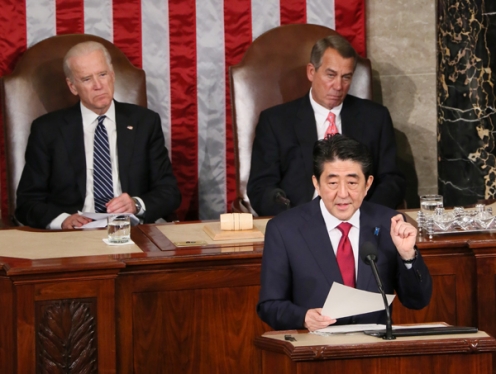
Prime Minister Abe delivers an address titled “Toward an Alliance of Hope” to a joint meeting of the US Congress on April 29, 2015.
Full video: https://www.youtube.com/watch?v=HpLDJ_J-V88
Photo and video: Cabinet Public Relations Office
Tanaka: Carole King made an appearance during the speech to the US Congress, didn’t she?
Abe: I quoted her lyric “you’ve got a friend.” I’ve listened to that song a lot from long ago, but I used her song “You’ve Got a Friend” to express thanks to the United States for extending a hand of help at the time of the Great East Japan Earthquake. That was the idea of Imai Takaya, Executive Secretary and Special Adviser to the Prime Minister.
Tanaka: From the perspective of reconciliation between Japan and the United States, your Pearl Harbor speech (27 December 2016) was also impressive.
Abe: That speech was also an attempt to appeal to the hearts of the American people while using many poetic expressions. Most of my important speeches were painstakingly worked out via thorough discussion with Taniguchi, and sometimes people such as Imai and Secretary Suzuki Hiroshi of the Foreign Ministry also participated.
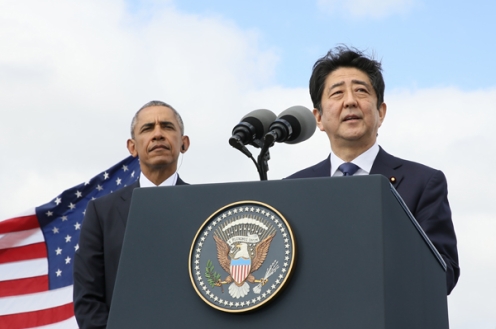
Prime Minister Abe delivers a speech titled “The Power of Reconciliation” at the Pearl Harbor Visitor Center in Honolulu in Hawaii on December 27, 2016.
Full video: https://www.youtube.com/watch?v=HpLDJ_J-V88
Photo and video: Cabinet Public Relations Office
Tanaka: They were carefully crafted, not just the contents, but how they were read, performed, right down to the details. To that extent, the preparation must have been hard?
Abe: That’s right. Particularly for speeches in English, I spent a considerable time on preparation. Mr. Taniguchi corrected my pronunciation and gave me advice on gestures.
But as the Prime Minister of a country, I’d be wasting a precious opportunity if I didn’t impress the existence of Japan properly on the hearts of the audience. Japanese people naturally make a virtue of modesty. But the nation called Japan has the world’s third-highest GDP, and it’s a country with high latent capability in the areas of politics, economics and security. Surely it’s an important duty of the Prime Minister to properly promote what kind of vision that country has and how it wants to engage with international society?
Tanaka: As you point out, language has always had great power for diplomacy, and in that sense you could say that the existence of excellent speechwriters is essential to raising the profile of Japan in international society. At our school (National Graduate Institute for Policy Studies), we run a program called “Diplomatic Academy” which provides professional training to young officials from various ministries. As part of that, we ask Mr. Taniguchi to give a speechwriting class as an instructor, and the Confluence of the Two Seas speech to the Indian parliament is used as teaching material for those lessons. Having the people, media and academia correctly understand the importance of speeches, and nurturing the human resources to take on that responsibility, are essential elements in the advancement of our fundamental diplomatic capabilities. Thank you for sharing so much of your time.
Translated from “Tokubetsu intabyu “Abe gaiko 7 nen 8 kagetsu wo kataru (IV)” ―Kantei gaiko wo sasaeta soshiki, hito, kotoba (Abe Shinzo on Japan’s diplomacy during the seven years and eight months he was in office (Part IV): The structures, people and language that supported prime ministerial diplomacy),” Gaiko (Diplomacy), Vol. 67 May/Jun. 2021 pp. 100-105. (Courtesy of Toshi Shuppan) [June 2021]
Keywords
- Abe Shinzo
- Former Prime Minister
- Tanaka Akihiko
- National Graduate Institute for Policy Studies (GRIPS)
- Abe Diplomacy
- National Security Council
- National Security Secretariat
- constitution
- Fundamental Law of Education
- Ministry of Defense
- national interest
- Yachi Shotaro
- Taniguchi Tomohiko
- speeches
- Confluence of the Two Seas
- Pearl Harbor
- The Power of Reconciliation



